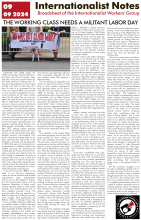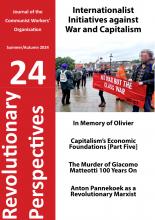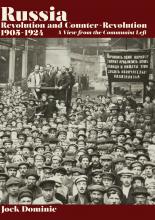These couple of mistranslations which I found can serve as a start to a broader, hopefully fruitful, discussion about the general issues of family/marriage, prostitution, and the revolutionary response. I also go into some detail about Makhnovists (yes it is only a detail, but it's permissible to discuss, similar to how eg Trotsky's Terrorism and Communism Chapter 7 devotes an entire section to rebut Kautsky just on an apparent detail involving women and girls).
Mistranslation in Lenin Collected Works Volume 35
The English translation of the following place in Lenin's 9 August 1918 message is so misleading, that I insist on describing it as an error:
... shoot and deport the hundreds of prostitutes who are making drunkards of the soldiers, former officers and the like.
For the word 'drunk' (спаивающих) the translator went with the accusative case, instead of the (equally correct, but) more plausible nominative case. In the original Russian sentence, 'prostitutes' is separated by a comma from 'drunk soldiers' so that there is no emphasis on prostitutes ("who are making" is absent), and it is clear that prostitutes are merely in a list of several sorts of people to whom Lenin's (two different) commands variously apply. This comma is absent in the official English translation. It should've been clear, that the figure of "hundreds" refers to all the different sorts of people together in the list, and not to the number of prostitutes alone (Mike H posted this order by Lenin on the Libcom-site under the libelous title 'Lenin orders the massacre of sex workers', with the word 'massacre' indicating he interpreted it as a large-scale shooting of hundreds of prostitutes). I doubt there even existed in total hundreds of former officers in the specific city. But the existence of numerous drunk soldiers is most plausible. Yet the existing English translation gives the impression, that the drunk soldiers were not even a target (for shooting or deporting) at all!; and even that in Lenin's mind, prostitutes were to blame for making drunkards not only of the soldiers, but of the former officers (and the like) as well.
Following Lenin's order, only some drunk soviet men received light sentences (lighter than for DUI in the US), so no shooting (as Lenin perhaps did intend capital punishment threats for drunkeness), and zero punishment for the prostitutes. For a highlight just on the actual punishments for drunkeness see eg here: tapatalk.com (since Libcom's site-upgrade made linking to individual posts impossible). There is no evidence that actual deportation of prostitutes from the city was carried out, but it can be conceded that Lenin's order intended this, without thereby slandering the Bolsheviks, given the understanding that apparently such a practice was also ordered even prior to (and outside of) the Civil War situation, by the Kronstadt sailors no less:
On May 13 (1917) the soviet resolved: 'The sole power in Kronstadt is the Soviet of Workers’ and Soldiers’ Deputies.' ... Card playing in the city was forbidden. All brothels were closed, and their inmates deported. Under threat of 'confiscation of property and banishment to the front,' the soviet forbade drunkenness in the streets. The threat was more than once carried into action.
A large volume (2006) of materials of the Makhnovists has evidence, that both drug use (drunkeness) and prostitution were considered a problem also by anarchist leaders; document No. 187, maybe written by Makhno himself (December 1919), refers to prostitutes; document No. 166 is an appeal to stop 'the partying and debauchery' and become 'again faithful sons of the revolution' (December 1919); document No 191 (January 5, 1920) threatened with capital punishment: "I order ... to stop drunkenness and insidious treatment of civilians. Since I noticed today a lot of drunkenness on the part of the rebels, as well as on the part of the commanding staff, if you do not stop all this, the perpetrators will be punished up to (being) shot." Makhno's order No.1 in Summer 1919 contained this line: 'Drinking is a crime. An even bigger crime is for the rebel of the revolutionary army to appear drunk on the street.' Even the Makhnovist congress of 2 November 1919 had already issued a resolution on drunkeness with capital punishment.
About drinking and prostitution, there is this famous anecdote involving Makhno in person kiling drunk people:"One day in Berdyansk, Nestor [Makhno] with all those 'brothers' gathered all the prostitutes of the city into a large hostelry. There was build a mountain of a feast. The very best and finest wines were unearthed from Berdyansk's cellars. Then all the prostitutes were lined up and began the choice of 'Batko'. This sets off in motion fists, guns for the possession of this or the other prostitute – it ended thereby, that Nestor began to shoot on everything and everyone and on the spot several persons were laid down. Source: Isaak Teper (Gordeev)'s 1924 book on Makhno, p. 28 (my translation), online: drive.google.com "
In the interpretation of one commentator (text hosted on theanarchistlibrary), among his victims were also prostitutes (Махно не выдержал и с омерзением начал стрелять и в девок, и в «единомышленников»); another couple of commentators (Вольный Бердянскa, pp. 134-35) add further details (without basis in Teper's book), that this scene happened in a brothel, but that even before entering the brothel there already had been another fight between anarchists for a girl (this one Makhno sent home to her family in Pischani Brid – an incredble level of detail, without source).
Relevant is also the issue of drugs in general (as political issue as eg food quality for poor school children), even apart from its interconnection to prostitution. The article "Cocaine revolution" is an easy read on how usage of cocaine (a legal medical drug at the time) became abnormally widespread during the Russian Revolution – just put it in an e-translator: web.archive.org Kotkin (2014, p. 195) writes that "Bolshevik propaganda spread rumors that Kerensky was addicted to cocaine and morphine, dressed in women's clothing, embezzled from state coffers".
[T]he chaos following municipalisation and nationalisation not only resulted in fewer pharmacies; it also meant cessation of the former governmental controls over drug dispensation. Many drugs now were plied on the streets. Source: 'Abuse of Drugs other than Alcohol and Tobacco in the Soviet Union', Conroy, Soviet Studies, Jul., 1990.
Historical examples of proletarian action (independently of Lenin) against prostitution will not convince supporters of what they call “sex work” (also see Aleksandra Jakubczak's Phd-thesis, or watch her Youtube-video ‘Jewish workers against prostitution and white trade slavery in Warsaw’ on the 1905 Alfonse pogrom). Nor will it change their feeling, that Lenin's order still is awful insofar as it called for deportation of prostitutes. So we must still counter the arguments on the general issue of prostitution, and I'll, as a mere start, contend with the position of certain Marxists on it.
Mistranslation in MECW Volume 6
Echoing Kollontai, one Marxist-sounding argument for upholding/expanding today's legalisation of prostitution roughly goes like this: If, – as the prostitution-abolitionists (branded "SWERFs" by their opponents) seek out, – the state would begin to punish men for buying "sex", then, to be consistent, so should men be punished for marrying, but as clearly (runs the assumption) we don't (or can't) criminalise marriage, so men's use of prostitutes shouldn't be criminalised either.
The Communist Manifesto is speaking about abolition of bourgeois marriage, and notes the "erzwungenen Familienlosigkeit der Proletarier", erroneously translated in English as the "practical absence of the family among the proletarians" (see MECW volume 6). A correct translation would be the "forced family-absence among proletarians", which conveys the authors' negative view about the absence of family. In French and Italian it was correctly translated: 'la suppression forcée de toute famille pour le prolétaire'; 'coatta mancanza di famiglia del proletario'. The meaning of this problem (for Marx/Engels and later Kautsky) is that proletarians are unable to have a family, whether unable to start or maintain one (with still nursing mothers and prepubescent children already having to go to work). Marx's agenda was not about criminalising marriage or the family as such.
With the mention of bourgeois marriage/family in relation to prostitution, Marx did not say that bourgeois wives are in the same material situation or economic dependence as (poor homeless) prostituted women. The comparison (to prostitution) was due to his observation, that bourgeois men seduce each other's wives, which means that they in fact don't uphold the essence of marriage. He calls bourgeois men's infidelity "nonofficial prostitution", which in the English translations is rendered as "private" prostitution. Marx was therewith not celebrating the practice of this destruction of the essence of marriage. Nor is he celebrating the practice of child labour. Secondly, in Marx's time marriage entailed forced marriages, sexually-abusive marriages, etc. Today wives are legally allowed to divorce, certainly when their husband commits adultry. Forced marriages (and there is also the concept of marital rape) are today explicitly illegal. It is hailed as progress, that the state now in fact can punish men for marrying in this way, ie when the marriages are forced, or are abusive. The fact is, is that the classical bourgeois form of marriage (its aspects which Marx had in mind) since then de jure has been crimininalised or abolished. The family has become better preserved, thanks to the criminalisation of child labour.
So this specific argument of prostitution-apologists (which relies on the marriage-comparison) could possibly be valid, either if they only point to non-monogamous "open" marriages (which don't in fact uphold the principle of marriage), or if they could point to modern examples of states that legally allow forced marriages (+forms of marriages without a legal option to divorce), as if we still lived a century ago.
Their assumption is that still in the modern form of marriage it's legally acceptable (and within the power, or within the desire) for a husband to obtain sex from his wife at any time he alone decides (basically marital rape), solely thanks to a shared bank account or buying her some gift. If the wife/girlfriend is so miserable, that she decides not to want to have sex with her husband, or (if she is so powerless to refuse) she does it unwillingly or on condition of money/gifts, I guess their argument is, that if a married husband can bribe his wife into sex, so should he be allowed to do the same with a bunch of other women, to whom he is not married? It can be answered to my point on how the bad forms (which Marx had in mind) of marriage are de jure criminalised, that so too are the bad forms of prostitution de jure already criminalised (or they should be, by the fight for rights, to sufficient protection, etc.). The apologists argue that criminalising the bad forms of prostitution can only be done by legalising a good form of prostitution (the essence of prostitution), just like I wrote happened with marriage. The Marxist-sounding line of argument, that law cannot in reality prevent the bad forms of marriage, is forgotten by them with regard to the bad forms of prostitution. If, as they claim, the protective rights for women in marriage (won since a century) don't help much in reality, in other words that the essence of marriage can't be redeemed by shedding its bad forms, why then do they believe there is hope in fighting in defense of rights of women in the function of prostitution?
They, who pretend that Marx celebrates that family/marriage (in its good essence, without abusive aspects) is already being abolished in practice by capitalism itself, are decrying that prostitution (in its "good essence", without abusive aspects) is supposedly being criminisalised (threatened with abolition) in practice. They claim Marx actively sought to abolish marriage/family totally (in its good essence), while believing prostitution (in its "good essence") should not (or even cannot) be abolished, as it is a type of labour activity as natural like agriculture, waste management (or maybe you believe in the future, that taking a shit will be abolished? – how shit-negative of you; see note), or stage acting.
note; The dangerous labour of sewage workers, one would hope communists would argue, in the future should be abolished by automation (machines to inspect and do maintenance in the pipes, although if bold utopians offer us their help, the pipe-system might be replaced by something better).










An example of the pro-"sex
An example of the pro-"sex work" argument (that I argue against above) is even found on this site: "Malignant Ulcers of Capitalism: The Proletarian Struggle for Reproductive Freedom" (leftcom.org , co-written by a comrade from Internationalist Communists Oceania). In passing this text reveals that this is a peculiar type of labour activity, namely a "job" that entails the risk of unwanted pregnancies:
It dwels on this peculiar job-risk only in order to argue that sex workers should have better access to abortion. I merely am questioning the Marxist justification given for such position. The text claims that:
The text before only quoted one exact line from Engels' Origins of the Family, Private Property, and the State. There is no exact reference given here to the page where Engels would have claimed something in the sense that "the abolition of the family (as an economic unit, the bourgeois family unit) is necessary for the abolition of prostitution". Perhaps the comrades would like to retract their claim?
By the way, I like to again point out that Richard Weikart, whose article 'Marx, Engels and abolition of the family' is cited in support by Sophie Lewis in her book, is a Christian creationist. I previously opposed reliance on Weikart's writing when it came to condemning Kautsky's alleged Social-Darwinism (this charge is a variation on the thesis that atheism leads to Hitler).
In The Origin of the Family,
In The Origin of the Family, Private Property and the State, Engels writes:
We can extend his argument further - the buying and selling of sex will only disappear with the disappearance of commodity society where the buying and selling of goods and services is the norm. This is what the comrades of the ICO are getting at and which you seem not to understand.
If you were correct Dyjbas,
If you were correct Dyjbas, then they could have equally phrased their sentence (pretending to paraphrase Engels) in the reverse order, like this: "the abolition of prostitution is necessary for the abolition of the family".
This also would make sense in the way you stated. Given that the buying and selling of services (and the pro-"sex work" position regards sex to be a service) is the "norm" of commodity society, the disappearance of this norm of commodity society is obviously necessary for the single family to cease to exist (as an economic unit of society, and, I'd add, this is still not the same as being abolished as such, like the comrades put it).
This reverse phrasing would also align better with the passage of Engels, who asks at its conclusion: "Can prostitution disappear without dragging monogamy with it into the abyss?" (he didn't ask eg: "can monogamy disappear without dragging prostitution with it into the abyss?"). But the comrades didn't phrase it like this (for that would have been interpreted as the position of prostitution-abolitionists), and so I can't exclude my first interpretation, that they meant something else or in addition to what Engels said (and you quoted). Namely that (allegdely for Engels) it is necessary to first abolish the family, and that it is impossible to first abolish prostitution (and so they make Engels side with the pro-"sex work" position).